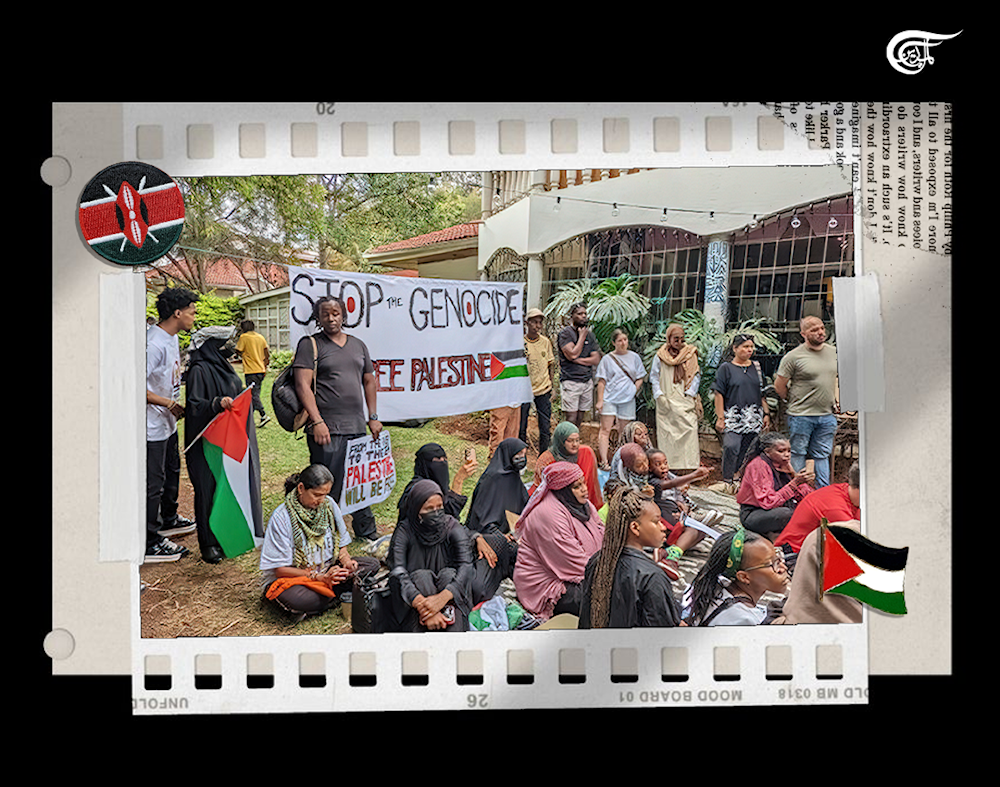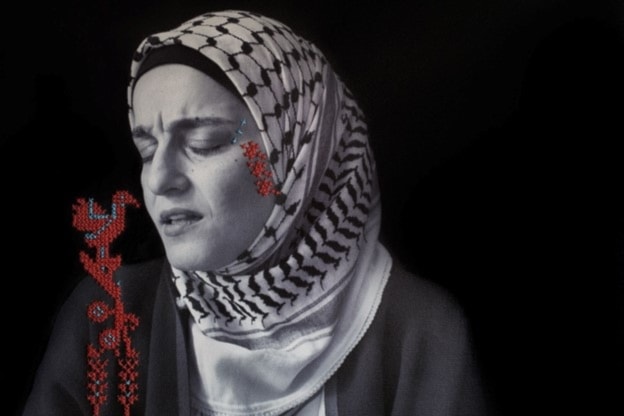Resilience against State Censure and ‘Hasbara’ in Kenya
The acts of the Kenyan government are a calculated effort to muffle the growing voices of solidarity with Palestine.
-

Activists at Cheche Nairobi (Courtesy: Kenyans4Palestine)
In Nairobi, a perplexing absence looms large. As the world continues to witness massive protests in solidarity with the Palestinian struggle, the city seems to have remained conspicuously silent. This silence is not an absence of support but a result of a more insidious force at play—the overt censorship and suppression of freedom of speech and freedom of assembly executed by the state on behalf of "Israel".
On New Year’s Eve, community organizers staged a flash mob in defiance after months of repression. Perhaps signaling a different trajectory for 2024. “This year, we’ll be pushing back for Palestine” C.W, a feminist organizer who was part of the group, tells Al Mayadeen English.
Since the onset of the genocide in Gaza, organizers in Nairobi have been fervently attempting to orchestrate a broad-based coalition demonstration. A planned protest outside the Israeli Embassy was swiftly disrupted and protesters accosted.
In Mathare, community organizers gathered to protest before being dispersed by police. The aim of the solidarity coalition is clear: to amplify the collective voice of Nairobi in unison with other major cities around the world. The resonance of the call for solidarity is felt strongly in the Kenya-Palestine coalition — a collective of Kenyan activists, intellectuals, and community organizers in Solidarity with Palestine.
However, the path to solidarity in Nairobi has been paved with obstacles, chief among them being the suppression of freedom of speech and assembly. The Kenyan government, through overt censorship measures, has strategically stifled the voices of those seeking to raise awareness and stand against the injustices faced by the Palestinian people. The refusal of relevant government officials to address media queries on the genocide in Gaza has been the most egregious.
The denial of permits for peaceful marches and gatherings becomes a glaring example of the subtle yet powerful ways in which dissent is quashed. Naomi Barasa, who is one of the spearheads of the movement, explains that the police operate on impunity as they have no powers to deny or issue permits as the Constitution of Kenya only requires that protestors inform the police of planned mass action.
Back in October 2023, members of the Kenya-Palestine coalition called off a march initially scheduled outside the US Embassy in Nairobi. The police warned of potential arrests for any gatherings outside the Embassy. Despite relocating the gathering to a private venue, the police showed up and arrested some people and confiscated flags and signs held by those gathered there.
Later in December, Barasa, alongside other activists organized “Christ bombed out of Gaza,'’ a series of reflections on Israeli violence in Jesus Christ’s birthplace during the Christmas period.
In Bethlehem, the birthplace of Jesus, Christmas was canceled due to ongoing genocidal bombings in Gaza and the persistent occupation in Palestine. The grim circumstances left the community with no cause for celebration. In an act of resistance, they chose to convey a radical religious message, illustrating the parallels between Jesus's birth in 2023 as a refugee in Bethlehem, facing exile and King Herod's massacre of infant boys, and the current plight of Palestinian families enduring similar hardships in Gaza under Israeli actions.
As a further act of resistance, a public event was organized in the CBD on the 26th, intentionally avoiding notifying the police, anticipating a predictable rejection if they had chosen to do so. Barasa Explains.
In Parliament, Dadaab MP Farah Maalim was censured for simply wearing a Keffiyeh. The Speaker of the National flagged the scarf as a “breach of parliamentary regulations”.
Other MPs chimed in with their disapproval, pointing fingers at the legislator for flouting the House rules.
“Since October 7th, we have struggled to hold a public action in Nairobi. We have been inspired by our comrades in Kisumu and Mombasa who have had marches in solidarity with Palestine. There are many people in Nairobi grieving and wanting to speak out against the ongoing genocide. But despite this enthusiasm, we have faced significant police intimidation, with people being threatened and even illegally arrested, just for wearing or holding the Palestinian flag.” Community organizer Maya Sikand says.
These acts are not just a bureaucratic hurdle; they are a calculated effort to muffle the growing voices of solidarity with Palestine. The government's overt maneuvers are meant to cast a shadow over the city's potential to strengthen the global movement for justice.
Meanwhile, "Israel’s" propaganda machine is allowed free reign in Kenya. The Israeli ambassador in Kenya has been on a media tour in an attempt to control, shape, and distort narratives. Former IOF soldier Gilad Millo and self-proclaimed “Zionist artivist” headlined performances at the Jamhuri day celebrations this past December and has been on a Hasbara mission in various media houses and churches across Kenya.
Hasbara can be roughly interpreted as "explaining" in English and gained popularity in the early 20th century through the efforts of Nahum Sokolow, a Polish Zionist journalist.
Hasbara bears similarities to other contemporary forms of propaganda but is specifically associated with detailed distortions and fabrications on a case-by-case basis, employed by the Israeli occupation to rationalize its contentious actions and policies.
In Kenya, Hasbara tactics manifest in Gilad’s propaganda through music, media interviews, and meetings with evangelical church leaders and politicians.
Still, there’s pushback. Nairobi-based Palestinian visual storyteller Rasha Al Jundi’s, ongoing multimedia documentary photography The Grapes Were Sour: Embroidered Palestinian Stories combines portraiture, audio, and hand-applied traditional Palestinian embroidery to tell the stories of displacement in the ongoing Nakba.
“Through my project, I aim to shed light on individual stories of Palestinians in exile and utilize those accounts to highlight larger themes around the ongoing Nakba. I started working on the project in August 2022 and officially launched it in October of that same year. So far, I have documented 28 stories of exiles in Amman, Berlin, and Nairobi, and I embroidered 74 portraits. The project also includes audio pieces that I weave in with selected portraits for each participant and archival materials where suitable to each story” Rasha tells Al Mayadeen English.
-

"We don't cry at funerals. We have to ululate. We cry at weddings", Rouqaya, 36, from Qalunya, Jerusalem (by Rasha Al Jundi)
Through common themes such as forced displacement and exile, identity, collective trauma, denial, and seeking self-determination, I intentionally edit the stories to connect the dots between different pieces and complete a tapestry of Palestinian voices that are eager to share their own stories with other fellow Palestinian exiles and in face of the well funded “explanation” Hasbara, which is the Zionist propaganda accounts that clog social media and other online platforms with the colonial Zionist narrative.
I realize that this project is not a match to counter such state-sponsored mechanisms that wash the mainstream followers’ minds into blind support of the Zionist entity. That said, I believe in using my art and doing my part in pushing the narrative in the right direction. Learning about what has really been happening to Palestinians in their own land remains an individual burden that should fall on each able and informed adult out there. Through this project, I am reaching out with what I hope is a more interesting way to ease this burden and enhance an international audience’s knowledge of our struggle.” Rasha adds.
In 2024, as state censure and Hasbara efforts intensify in Kenya, so does the resistance.

 Maureen Kasuku
Maureen Kasuku
 7 Min Read
7 Min Read







